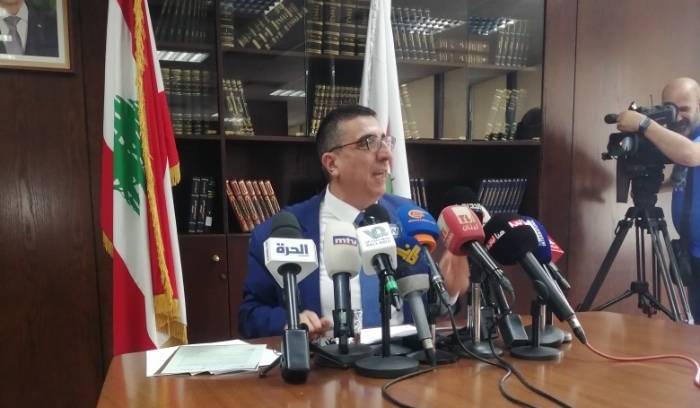
Caretaker Social Affairs Minister Hector Hajjar speaks at a press conference on May 26, 2023. (Credit: NNA)
After initially announcing they would distribute financial aid to Syrian refugees in dollars, UN organizations have now reversed their decision.
Under pressure from Lebanese authorities, they will continue to provide aid in the national currency for at least a month, while seeking to establish a suitable mechanism with the government.
This occurs amid the Lebanese lira’s sharp decline, with the currency trading at approximately LL94,000 to the dollar on the parallel market.
Backtracking
On May 23, UN Special Coordinator in Lebanon Imran Riza, UNHCR representative Ivo Freijsen, and World Food Programme (WFP) representative Abdallah Alwardat issued a joint press release that soon ignited controversy.
They announced their decision to resume providing aid in cash and in dual currency (Lebanese lira and dollar) from the end of May, following the same practice as before the 2019 crisis.
The decision was made after extensive consultations with relevant counterparts, government authorities, and Banque du Liban (BDL), the statement said.
The statement further explained that due to operational challenges, such as the national currency’s rapid devaluation, heightened currency fluctuations and the strain on the financial services provider to handle substantial amounts of cash in the Lebanese lira, it had become unfeasible for the UN and its partners continue to deliver cash assistance solely in lira.
According to the press release, the UN said its decision was based on the shift to the dollar or dual currency assistance programs in Lebanon, including the government’s National Poverty Targeting Programme, which already supports vulnerable Lebanese individuals. The availability of both currencies for beneficiaries allows them to exchange their cash assistance for either dollars or Lebanese lira.
However, in a new joint statement on May 27, the three UN representatives declared that they would “temporarily” suspend the use of dual currency for the payment of cash aid to refugees for the next month, at the request of caretaker Prime Minister Najib Mikati and caretaker Social Affairs Minister Hector Hajjar.
The decision was made after a series of meetings held the previous day, and the statement mentioned that discussions would continue regarding the “appropriate modalities.”
‘What about Lebanese citizens?’
The UN’s decision reversal follows a press conference held last week by Hajjar, during which he strongly criticized the UNHCR.
The dispute between Hajjar, who oversees the implementation of the Lebanon Crisis Response Plan (LCRP) and international organizations, primarily revolves around his view toward Syrian refugees.
One point of contention is the availability of refugees’ data held by the UNHCR, which Hajjar claims the organization is refusing to share with Lebanese authorities.
The disagreement between the minister and the UN also centers around humanitarian aid for and the repatriation of refugees.
“Are we requested today to strengthen the capacities of displaced persons at the expense of Lebanese citizens,” Hajjar told L’Orient-Le Jour, in reference to the cash assistance in dollars to Syrian refugees.
“My ministry is the overseeing authority for the LCRP. Lebanon has no interest in paying aid in dollars. Any alteration in the [payment] modality is unacceptable,” Hajjar said.
International organizations provide aid in dollars, but the Lebanese government converts it into Lebanese lira for distribution to refugees, which leads to a decrease in their income due to the instability of the local currency against the greenback.
“We were not consulted on this matter, despite being the relevant ministry,” Hajjar said in a press statement on Friday.
Although the issue has been under discussion, no decision has been reached yet.
“We have not been provided with any official documentation regarding this matter,” Hajjar told L’Orient-Le Jour.
The minister’s second argument centers around the perceived injustice that this measure would inflict upon the most vulnerable Lebanese families.
“The monthly amount of $140 dollars that a refugee family would receive is significantly higher than the salary of a first-category civil servant paid in Lebanese lira,” Hajjar explained.
He also highlighted that “the number of Syrian beneficiaries, amounting to 230,000 families, is much higher than the number of Lebanese beneficiaries, which stands at 70,000 families.”
“The assistance provided to these Lebanese families was disbursed in Lebanese lira until yesterday (Thursday). Therefore, we strongly oppose perpetuating this injustice, which further solidifies the presence of Syrian refugees in Lebanon,” Hajjar said.
He went on to suggest that international organizations should redirect their aid to Syrian refugees in Syria, with the aim of encouraging their return to their home country.
The inevitable political turn
“UNHCR’s s primary objective is to ensure that refugees continue to receive assistance that addresses their most basic needs,” Lisa Abou Khaled, UNHCR Press Officer, told L’Orient-Le Jour.
The reversal in policy over the dollar assistance is expected to be temporary.
“Cash assistance provided to vulnerable individuals in Lebanon, regardless of their nationality, should reflect the worsening situation to ensure that minimum standards for survival are upheld,” she added.
The controversy surrounding the cash assistance inevitably took a political turn, pitting Hajjar, closely associated with the Free Patriotic Movement (FPM), against Mikati.
Hajjar accused Mikati of giving his verbal consent to the dollarized aid without informing him.
But during the press conference, Hajjar went on to express his desire to avoid a conflict with the prime minister or the government.
Mikati’s supporters have refrained from engaging in the controversy and instead emphasized the technical aspects of the issue.
Ali Darwish, a former MP for Tripoli and a close associate of Mikati, told L’Orient-Le Jour of the need to provide aid to refugees. However, he also expressed support for two aspects: ensuring that the assistance given to the most vulnerable Lebanese is not less than that provided to refugees, and the possibility of the return of refugees to Syria.
The “solution lies in the implementation of dollar-denominated aid for both Syrian refugees and Lebanese citizens,” he said.
This article was originally published in French in L'Orient-Le Jour. Translation by Sahar Ghoussoub.